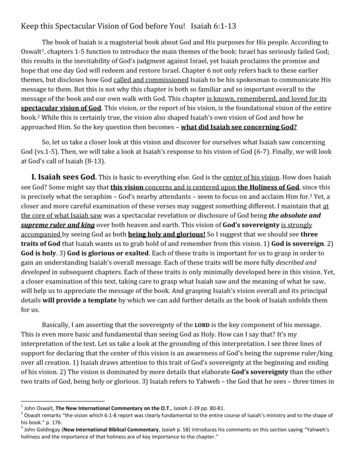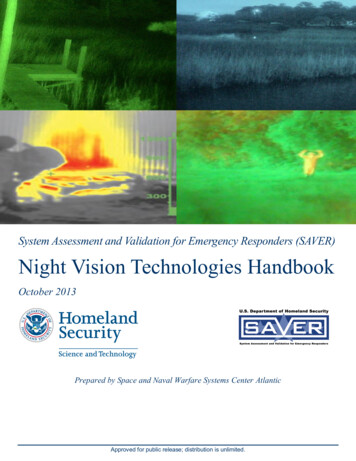
Transcription
Keep this Spectacular Vision of God before You! Isaiah 6:1-13The book of Isaiah is a magisterial book about God and His purposes for His people. According tochapters 1-5 function to introduce the main themes of the book: Israel has seriously failed God;this results in the inevitability of God’s judgment against Israel, yet Isaiah proclaims the promise andhope that one day God will redeem and restore Israel. Chapter 6 not only refers back to these earlierthemes, but discloses how God called and commissioned Isaiah to be his spokesman to communicate Hismessage to them. But this is not why this chapter is both so familiar and so important overall to themessage of the book and our own walk with God. This chapter is known, remembered, and loved for itsspectacular vision of God. This vision, or the report of his vision, is the foundational vision of the entirebook.2 While this is certainly true, the vision also shaped Isaiah’s own vision of God and how heapproached Him. So the key question then becomes – what did Isaiah see concerning God?Oswalt1,So, let us take a closer look at this vision and discover for ourselves what Isaiah saw concerningGod (vs.1-5). Then, we will take a look at Isaiah’s response to his vision of God (6-7). Finally, we will lookat God’s call of Isaiah (8-13).I. Isaiah sees God. This is basic to everything else. God is the center of his vision. How does Isaiahsee God? Some might say that this vision concerns and is centered upon the Holiness of God, since thisis precisely what the seraphim – God’s nearby attendants – seem to focus on and acclaim Him for.3 Yet, acloser and more careful examination of these verses may suggest something different. I maintain that atthe core of what Isaiah saw was a spectacular revelation or disclosure of God being the absolute andsupreme ruler and king over both heaven and earth. This vision of God’s sovereignty is stronglyaccompanied by seeing God as both being holy and glorious! So I suggest that we should see threetraits of God that Isaiah wants us to grab hold of and remember from this vision. 1) God is sovereign. 2)God is holy. 3) God is glorious or exalted. Each of these traits is important for us to grasp in order togain an understanding Isaiah’s overall message. Each of these traits will be more fully described anddeveloped in subsequent chapters. Each of these traits is only minimally developed here in this vision. Yet,a closer examination of this text, taking care to grasp what Isaiah saw and the meaning of what he saw,will help us to appreciate the message of the book. And grasping Isaiah’s vision overall and its principaldetails will provide a template by which we can add further details as the book of Isaiah unfolds themfor us.Basically, I am asserting that the sovereignty of the LORD is the key component of his message.This is even more basic and fundamental than seeing God as Holy. How can I say that? It’s myinterpretation of the text. Let us take a look at the grounding of this interpretation. I see three lines ofsupport for declaring that the center of this vision is an awareness of God’s being the supreme ruler/kingover all creation. 1) Isaiah draws attention to this trait of God’s sovereignty at the beginning and endingof his vision. 2) The vision is dominated by more details that elaborate God’s sovereignty than the othertwo traits of God, being holy or glorious. 3) Isaiah refers to Yahweh – the God that he sees – three times in1John Oswalt, The New International Commentary on the O.T., Isaiah 1-39 pp. 80-81.Oswalt remarks “the vision which 6:1-8 report was clearly fundamental to the entire course of Isaiah’s ministry and to the shape ofhis book.” p. 176.3John Goldingay (New International Biblical Commentary, Isaiah p. 58) introduces his comments on this section saying “Yahweh’sholiness and the importance of that holiness are of key importance to the chapter.”2
a way that acknowledges Yahweh’s sovereignty. So with these thoughts in mind, let us take a closer lookat this key chapter.A. The Kingship of God is Isaiah’s focus. This is how he begins this chapter: “In the year thatKing Uzziah died, I saw the Lord seated on a throne .” The mention of Uzziah’s death helps us anchor thisvision at a point in time and in a particular context. Uzziah died sometime between 742-735 B.C. Thevision occurred at the death of this King of Judah, who reigned for some 50 years.4 Now, the year of hisdeath marked an end of a period of stability and prosperity. Assyria had an aggressive foreign policy.Assyria now poses a severe threat to Judah and the region. So what is going to happen next? Isaiah seeswhat is important to see at this crucial turning point: The LORD reigns! The LORD is in control of events.Isaiah sees this by communicating this fact that he sees his God-the LORD as lord. It sounds confusing andit is; but please do not miss Isaiah’s point. The One he sees is the Lord (Adonay). This is not God’spersonal name Yahweh, which the God of Israel disclosed first to Moses, then to all of Israel. This isIsaiah’s assertion that the one he sees is the King or true king or sovereign of Israel and over Israel. Payattention to the concluding verse to the main part of what he sees in his vision. He ends his report of whathe sees by saying “my eyes have seen the King (MLK) – the LORD (Yahweh) Almighty. I think that Isaiahintentionally draws attention to what he considers the focus of his vision by using two different butsynonymous words for a ruler – lord and king – at the very beginning and ending of his vision. God is thesovereign king.B. Royal Setting and details dominate Isaiah’s vision. Explicitly and implicitly Isaiah wants usto see the royal context and royal coloring of his vision. The King that he sees is on His throne, in hispalace, wearing a royal robe,5 in his throne room or court surrounded by his attendants. Now, am I guiltyof overstating this royal perspective? The unbiased reader would agree about seeing two of the fivedetails, i.e., the throne and the robe, but that is all. Right? No! The 3rd detail, which may be missed, isseeing God in his palace, not just in his temple. The NIV rightly translates the original word that Isaiahuses in verse one as: I saw the LORD and the train or hem of his robe filled the temple. This is right to apoint. Isaiah may have been in the temple in Jerusalem, which is also called His house. “The thresholdsshook and the house (ESV version; not ‘the temple,’ NIV) filled with smoke. It is not significant that theNIV translates house as temple and the ESV translates it literally as house. What is important is that theword used in verse one for temple is also translated as palace almost exclusively when the word is usedfor the house or home of human ruler.6 What is important to see is that the temple was seen as thehouse that God dwelled among his people but also his palace.7 Biblically speaking, when we talk of theark of God, we should see it as God’s throne. While Isaiah does not explicitly mention God being in Hiscourtroom or throne room, this detail of God royal court is mentioned explicitly earlier by Isaiah, whenon God’s behalf he said, “Who has asked this trampling of my courts” (Is.1:12). This is a reference to oneof the courts or halls of a palace.8C. Three times Isaiah refers to the LORD as the Lord. “I saw the Lord seated on the throne.”(vs.1); “I heard the voice of the Lord saying whom shall I send.” (vs. 8); “Then I said how long O Lord?”(vs.11). Granted, Isaiah refers to the LORD in this way over the entire chapter, and not just in the core4Goldingay dates Uzziah’s death as occurring sometime between 742 and 735 B.C., p.58.The kings of Israel and Judah wore royal robes; so does the true king of both kingdoms. See 1Kings 20:10.6The same word translated as temple here is translated as palace in 1 Kings 21:1. Context determines the translation.7rdOswalt: the Hebrew word for temple/palace originally comes from the 3 millennium. It has a strong royal connotation. p. 178.8See 2 Kings 20:4 “Before ”5
vision that he sees. Granted, Isaiah also does refer to the LORD three times as being “holy” and thusemphasizing the Holiness of God as he hears the seraphim recognize this trait of God. This is significant.Yet, this reference to the LORD as Lord is a clear acknowledgment of his sovereignty. This usage by Isaiahis a clear reference to God “being the absolute overlord of the earth with whom all people have to do.”9Taken together with the previously two mentioned references to God being Israel sovereign in this vision,Isaiah is thus making it clear that Yahweh – the LORD – is Israel’s boss and owner.B. Isaiah sees God as Holy. Isaiah certainly was aware that Yahweh – the LORD – was Israel’s king and thesupreme sovereign over all. In this vision and throughout the book, Isaiah is keenly aware that Yahweh –the LORD – is the Holy One as well. This is Isaiah’s distinct title for the LORD that he sees. This is the first ofthe four titles that Isaiah used in chapter one to refer to the LORD. Perhaps it is not only his distinctiveterm, but Isaiah’s favorite term as well, since this title occurs 26 times in the book. According toGoldingay, Isaiah’s description as the Holy One is the fundamental description of God in the book.10. Andaccording to Goldingay, the entire book works out the implications of seeing God as being the Holy One.11So if that is the case, what is being conveyed by describing God as the Holy One?According to Biblical scholars, the term has two component meanings. One is a moral component;the other is a metaphysical component. Most of us get the fact that God is absolutely pure. God isabsolutely good and righteous. He is not evil. He never does anything wrong. He is fair and just. “He isutterly true.”12This is why he expects his people to be holy like Him. This is the basis for Goldingayasserting that “Isaiah makes a point of summarizing God’s call to Israel as ‘Maintain justice and do what isright.’ ” (Is. 56:1). Why? This is what God is and what God does!The 2nd element of the meaning of holy in reference to God is a metaphysical one. Don’t be turnedoff by the sound of this term. It is an accurate and meaningful word by which to describe God’s nature –God’s being – or His essence! This report of the vision of God that he witnessed and heard declaring thatGod is Holy: this meant that “Isaiah was in the presence of One who is very distinct from and utterlydifferent than himself.”13 This includes an awareness of being in the presence of one ethically andabsolutely good unlike himself. But much more! What should come to mind when we say that Godtranscends us and is different from us? Isaiah does not go into detail. From this vision of God and thedetailed response to what he sees concerning God, we can perhaps say that Isaiah was aware of beingfinite, mortal, and human before God who is One who is infinite. Or perhaps it was due to Isaiah catchinga glimpse of God in his glory, majesty, and exaltedness which the seraphim also sing about – in theirresponse to seeing and responding to God.C. God is glorious or exalted! In addition to seeing God’s sovereignty and his holiness, Isaiah iskeenly made aware of God’s exalted nature and status. Isaiah sees God’s glory! The seraphim recognizethis feature of God in their praise that is directed toward him. “Holy, holy, holy is the LORD Almighty; thewhole earth is full of his glory. Not only is the whole earth full of his glory, but heaven is too. Theseraphim are described as being above Him or perhaps they surround him and his throne like the9Oswalt, p. 177.Goldingay, Isaiah p. 14.11Ibid. p. 7.12Oswalt, p.181.13Oswalt, p. 181.10
cherubim of John’s vision of God14 who continuously worship and praise God. These angelic beings notonly recognize that the earth is full of the LORD’s glory, but being in the presence of God, they haveimmediate access to God and behold His glory directly. It is my understanding that this is a major themeof Isaiah’s message. One could easily overlook this theme or have it overshadowed and thereforeundervalued in light of other themes that Isaiah seeks to impress upon us. What does glory mean? Whatdoes Isaiah want us to be aware of when we speak of God being glorious?Isaiah is indirectly making a profound confession by reporting the angel’s declaration that thewhole earth is full of his glory. Oswalt defines glory as “an expression of the stunning importance andreality of God.”15 Oswalt captures succinctly what the angels see and what Isaiah sees himself in God’sthrone room. God is glorious! Isaiah sees what the angels see directly about God since they are in hispresence. He is One who is characterized by being stunning, extraordinary, majestic, awesome! Hissovereignty, his holiness, his power. Everything about God expresses this reality about Him. But how isGod’s glory related to his holiness?Goldingay comments that God’s “glory is the outward manifestation of Yahweh being holy.”16 Thiswould account for the angel’s announcement that even the whole world can see glimpses of God holinessbeing made evident to them. But Israel in her history was especially privileged to be witnesses to God’sglory being present with them and occasionally catching a vivid glimpse of his glory as they encounteredGod on Mt. Sinai where He displayed something of His great power and holiness by coming down on themountain with a cloud, smoke, fire, lightening, and the mountain shook. God tangibly displayed HisPresence or glory on that day.17 Isaiah uses the same imagery in verse 4 to describe not only whathappened in response to the singing; is it too much of a stretch for us to see that this is an allusion to twoof the several elements that happened when God presence came down on Mt. Sinai? Point: Isaiah iskeenly aware of the awesome stunning reality of God and His status!II. Isaiah’s response to God followed by God’s response to Isaiah’s response. (5-7) In verse 5, Isaiahsuccinctly relates his own response to seeing God in his glory. “Woe is me! I cried. I am ruined!” The 1stexpression – Woe – is an idiom which signals that some form of disaster is coming. Earlier Isaiah usedthis expression to announce that God was about to send some disaster to Judah. “Woe to the wicked!Disaster is upon them.” (Is. 3:11) In light of what he sees, Isaiah personally realizes that he is about toface disaster. The 2nd expression “I am ruined,” or better translated as destroyed.18 Isaiah realizes thatHe is done – doomed to die. Why? For two reasons. The first being that he, a mortal, has seen God. “I haveseen the King – the LORD Almighty. For God even declared to Moses that” no one may see me and live.”(Ex.34 20). But a greater reason for Isaiah expressing doom over his situation at seeing God is theawareness of God’s own moral holiness and his own lack of holiness. Isaiah makes this clear by saying: Iam ruined, for “I am a man of unclean lips and I live among a people of unclean lips.” Why does Isaiah focuson the lips only? For surely it is not only his words but his actions and Israel actions as well that areunclean? Oswalt comments saying: “Isaiah recognizes with sickening force that his character is not, anymore than is his people’s, in keeping with God’s character. Their lips do not belong to God, else they14Rev. 4:6 “In the center around the throne were four living creatures .”Oswalt, p. 181 footnote.16Goldingay, p. 59.17Exodus, 19:16-19.18Isaiah 15:1. The word ‘ruined’ is translated by NIV here as ‘destroyed.’15
would continually pour forth praise like the seraphim.”19 Isaiah lips express his heart. It does not belongto God. Thus he is painfully aware that he is unclean. So what can he do? Not much! But God can dosomething for Isaiah!God forgives Isaiah. God makes him totally clean. God removes his guilt. “Then one of the seraphsflew to me with a live coal in his hand, which he had taken from the altar. With it he touched my mouthand said ‘See, this has touched your lips; your guilt is taken away and your sin atoned for.’” This symbolicact of cleansing pictures concretely, yet symbolically, Isaiah’s sin being purged away by a fiery coal fromGod’s altar touching his lips. By this symbolic act, Isaiah is forgiven of his wrong doing and made rightwith God. How the fiery coal achieves this atonement and forgiveness is not important. What is importantfor us to see is that God takes the initiative to make things right between Himself and Isaiah. God throughhis angel approaches Isaiah in order to cleanse him and make Isaiah righteous! As a result Isaiah is nolonger doomed to die, but can enjoy being in the Presence of God. This is God’s mercy! This foreshadowswhat God accomplished for humanity by sending Christ into this world in order that by his death wecould be forgiven of our sin before a righteous God.III. Isaiah accepts a difficult and a depressing assignment from God. (vs. 8-13) Beginning with verse8, Isaiah concludes the account of his experience of “Seeing God” with a brief account of how God calledhim to serve him as his prophet. These six verses conclude Isaiah’s account of his vision of God bypresenting the difficult task that God gave Isaiah and depressing outcome for Isaiah’s ministry. Isaiahconcludes his account by making three points for us to see. 1) Isaiah accepted God’s call for ministry. 2)God indirectly but not directly, closed his people’s hearts to hear and respond to Isaiah’s preaching. 3)Isaiah was not coldly delivering God’s message, but strongly grieved over the projected outcome to hispreaching.A. Isaiah accepted God’s call to ministry. Isaiah begins this section describing his own call to beGod’s spokesperson or prophet. “Then I heard the voice of the Lord saying, Whom shall I send? And whoshall go for us?” (vs. 8) This is not what it appears to be! Isaiah is not volunteering for the job! For noprophet chooses to be a prophet on their own initiative. Isaiah did not dream of being a prophet. Thepattern of Scripture is that God calls a person to this office or task. The person then has to be willing toaccept the call. This was the pattern for Moses, Ezekiel, Amos, and Jeremiah. I find it difficult to believe itwas different for Isaiah. God called Isaiah. Isaiah in turn accepted the call.B. God indirectly but not directly closed the people of Judah’s hearts. (vs.9-10) God gaveIsaiah the assignment of closing the hearts and minds of the people. Verse 9 directs us to see these nexttwo verses as being God’s instructions-God plan concerning what Isaiah should tell or communicate tothe people on God’s behalf. “Go and tell this people” This is pretty straight forward. But the next 1 and ½verses appear to be very disturbing, for they present a troubling picture of Isaiah’s assignment. WasIsaiah called to deliberately close the minds and hearts of the people through his preaching? That is whatit appears that these verses are saying? Or is it perhaps better to see these verses as declaring theunsuccessful outcome as a result of Isaiah preaching. For God tells Isaiah from the beginning that Isaiahministry would not be successful. People would fail to listen to his messages. People would fail to graspthe message and turn or repent and be healed! (vs 10) How sad? Why? What happened?19Oswalt, p.183.
It appears from a careful reading of Isaiah chapters 1-5 that Isaiah in his ministry to Judah didexpose the people to people to their sin and to the consequences due to their sin. Isaiah disclosed thatGod was and would continue to punish the people for their sin and guilt. Isaiah called people to repentand be forgiven by God.20So Isaiah was faithful to his calling. But Isaiah’s preaching was met with closedhearts and minds. The people were not willing to repent. They even treated Isaiah and God withcontempt by declaring that Isaiah’s God should hurry up and bring his plan (judgment) to pass so thatthey could experience it. (Is. 5:19) So these verses of Isaiah (9-10) disclose God’s intention to close thepeople’s hearts and minds to hear and be receptive to Isaiah’ message. Did God close their minds andhearts? Yes! But it was only in response to the people having closed their minds first.21C. Isaiah strongly grieved over the projected outcome resulting from his ministry. (11-13)Isaiah’s grief is not explicitly stated. Yet this is Oswalt’s interpretation of these verses. How long OLord? The question to ask is how long for what? Isaiah seems to be directed to the ultimate objective andthe results stemming from Isaiah’ preaching and ministry. Isaiah realizes that his audience would notrepent. But how long would this last? How long would it be before they do and how long before Godforgives them and restores them? Not until all their cities were ruined and the land made into awasteland. This is devastating news! But it is not without some hope. Israel will be renewed and restored.For Isaiah compares Israel to an oak tree that has been cut down and destroyed. Yet this is not the end.For Isaiah declares that out of the stump that remains a holy seed will sprout again. Point: God is notfinished with Israel his people.2021See chapter one especially.So Goldingay, p.61.
Isaiah is thus making it clear that Yahweh – the LORD – is Israel’s boss and owner. B. Isaiah sees God as Holy. Isaiah certainly was aware that Yahweh – the LORD – was Israel’s king and the supreme sovereign over all. In this vision and throughout the book, Isaiah is keenl










